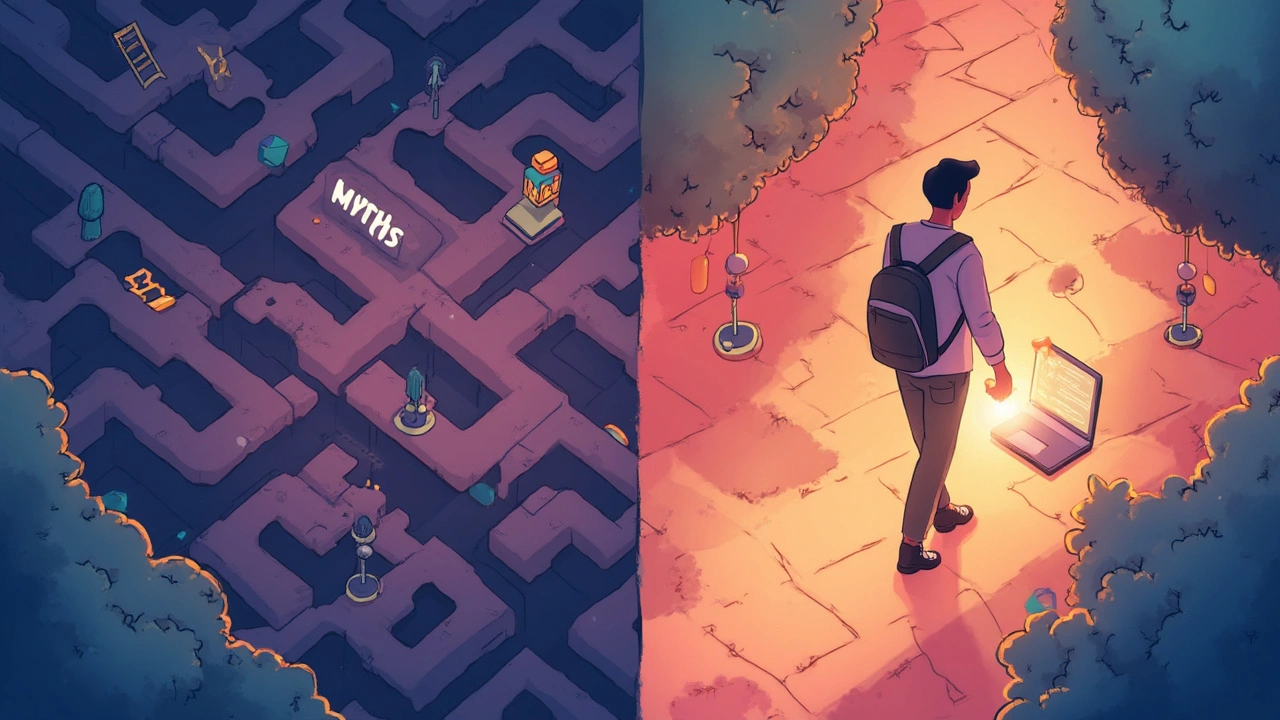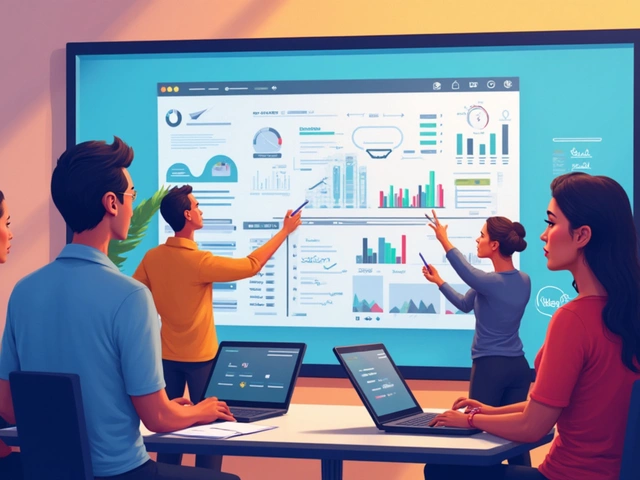If you’ve ever felt lost looking at a wall of code, you’re not alone. Coding has this reputation for being some impossible language only geniuses get. But here’s the thing—most people start with zero knowledge. Nobody’s born knowing what a function or loop is. That myth that you need to be super smart? Totally exaggerated.
Think about it: nine-year-olds build games in Scratch. Grandparents are building websites for their book clubs. What they have in common isn’t a magic talent, it’s patience and a bit of curiosity. Coding isn’t some mystery handed down to a lucky few. Sure, it’s challenging at first, like cooking your first meal or riding a bike. But with the huge supply of beginner coding classes, free resources, and peer help out there today, you’re not on your own.
Here’s a fact: in a 2024 survey, 67% of people who finished an intro to coding class said it was actually simpler than they expected. You’ll screw up sometimes (everyone does), but computers don’t get mad—they just give you error messages. So, if you can deal with some trial and error, you’re already ahead of the game.
- Why Coding Seems Intimidating
- What Makes Coding Easier Than You Think
- Common Mistakes Beginners Make
- How to Pick the Right Coding Class
- Tips That Actually Work
Why Coding Seems Intimidating
Most folks freeze up the first time they see a screen full of code. It looks like another language, and in a way, it is. The mix of curly braces, semicolons, and all those unfamiliar words makes it feel like you're trying to read an alien manual. This is often the first hurdle. According to a 2023 Stack Overflow survey, over 55% of new coders say the hardest part is just figuring out where to start.
Another reason? There's a common myth that coding is only for math geniuses. It’s easy to hear stories about child prodigies or folks who built apps before they could drive, but that’s clearly not the whole story. The truth is, you don’t need a PhD in calculus. You just need to get comfortable with problem-solving, and that takes practice—not superpowers.
"Programming isn't about what you know; it's about what you can figure out." — Chris Pine, author of 'Learn to Program'
Let's not ignore society’s expectations either. Movies always show programmers as lone geniuses typing insanely fast in dark rooms. In real coding classes—online or in person—you’ll see people of all ages, backgrounds, and skill levels just trying to make sense of their first 'Hello, world!'. It’s normal to feel out of place, but it’s not a sign you’re in over your head.
Here's what tends to freak people out most:
- The amount of new terms thrown at you from the start (like variables, loops, arrays)
- Fear of making mistakes with code
- Worrying about keeping up with others in class
- Thinking it’s too late to start if you’re not a teen genius
Seeing these struggles is part of the journey, not a sign you should quit. Once you understand that nobody gets it all right away, things start to feel more doable.
| Top Reasons Coding Feels Scary | % of New Coders Affected |
|---|---|
| Intimidating terminology | 66% |
| Fear of errors or "breaking" things | 53% |
| Lack of clear starting point | 41% |
| Comparing progress to others | 38% |
If you’re googling "Is coding hard to learn?", just know you aren’t the only one doubting if you can keep up. That feeling is totally normal, and it fades way quicker than you think after some hands-on practice.
What Makes Coding Easier Than You Think
There’s a reason more people than ever are signing up for coding classes. The truth is, learning to code has gotten easier over the last decade. A big part of that is the massive amount of resources—tutorials, forums, free courses, and even YouTube walkthroughs. You don’t have to sit alone banging your head against mistakes for hours. Now, answers are just a quick search away.
Another thing: coding tools and websites are built for beginners. Lots of platforms like Codecademy and freeCodeCamp use interactive lessons, so you write code and see what happens right away. This feedback loop makes mistakes less scary and even a little fun.
| Resource | Free/Paid | 2015 Users | 2024 Users |
|---|---|---|---|
| Codecademy | Both | 10 million | 100 million+ |
| freeCodeCamp | Free | Launched | 50 million+ |
| edX (CS50, etc.) | Free/Paid | 1 million | 5 million+ |
This explosion of platforms means beginners have tools literally tailored to their struggles. And forums like Stack Overflow or Reddit let you ask "dumb" questions without judgment. Most new coders use platforms like these because they turn tough topics into smoother lessons.
Also, many modern coding languages focus on making things clearer for someone new. Python, for example, reads almost like simple English: instead of confusing curly braces or semicolons, you use spaces and words. That’s why schools all over the world start with Python now—it hides a lot of the messy stuff and lets you concentrate on ideas.
- Instant feedback helps you see right away if your code works or needs tweaks.
- Big online communities are great support systems—you’re never really stuck alone.
- Visual tools (like block coding in Scratch) make it easier for total newbies to grasp programming concepts.
- Tons of coding problems online are sorted by level, so you build up confidence one solved task at a time.
The best part: you don’t need a fancy laptop. Even a basic computer or Chromebook gets the job done for almost every beginner project now. So the bar for entry’s never been lower.

Common Mistakes Beginners Make
Most people starting in coding fall into the same traps. It’s not about being bad at it—it’s just super easy to rush, get stuck, or make habits that slow you down. Here’s what you need to watch out for.
- Jumping into advanced stuff too early. Many excited beginners try to tackle frameworks, build apps, or learn fancy programming languages before nailing down the basics. This usually leads to frustration and total confusion.
- Ignoring error messages. The computer’s actually trying to help! Instead of just deleting error lines or copying code blindly from the internet, take a minute to read what’s wrong. You’ll find most bugs are simple typos or small mix-ups.
- Not practicing regularly. You can read all the tutorials, but unless you code a little every day, it won’t stick. Data shows people who code three or four times a week learn almost twice as fast compared to those who code once a week.
- Skipping comments. Adding notes to your code feels like homework, but your future self will thank you. Especially with tricky projects, comments save loads of time.
- Comparing yourself to others. Everyone learns at a different pace. Some pick up things super-fast, others need a few tries. What's important is staying consistent—not winning a race.
Check out this quick breakdown from a study on beginner mistakes in 2024 coding classes:
| Common Mistake | % of Beginners Reporting |
|---|---|
| Ignoring error messages | 54% |
| Lack of regular practice | 47% |
| Trying complex topics too soon | 42% |
| Skipping comments | 38% |
| Copying code without understanding | 31% |
The big takeaway? Take it one step at a time. Work on small wins each week and don’t sweat the mistakes—they’re part of the process. Slowly, coding will feel less painful and way more fun.
How to Pick the Right Coding Class
Choosing the right coding class can save you a lot of headaches. There’s a lot out there, from slick online bootcamps to in-person workshops and even free video tutorials. But not every option fits every learner. Here’s how you can figure out what works best for you:
- Know your goal: Want to build an app, get a job, or just understand your kids when they talk about Python? Different classes focus on different goals, so check the end project or learning outcomes before you jump in.
- Check the language: Coding languages aren’t all the same. HTML and CSS are great if you’re into web design, but Python or JavaScript might be better for apps and automation. If this is your first time, Python is often the most beginner-friendly, with a lot of easy wins early on.
- Don’t skip the reviews: Honest reviews from real students are gold. Look for feedback on teaching style, support, and if the content actually helps newbies. You’ll spot classes with outdated content pretty quickly.
- Support and community: Learning alone can mess with your motivation. Find courses that offer forums, Discord groups, or regular check-ins. It’s way easier to ask dumb questions (they’re not dumb, by the way) when you’re in a supportive group.
- Trial classes matter: Tons of platforms like Codecademy, Coursera, and Udemy let you try a portion of the class for free. Test drive before you commit your time or money.
If you’re deciding between platforms, here's a quick comparison of popular beginner-friendly coding class providers and what they offer:
| Platform | Languages Taught | Beginner Friendly | Cost | Community Support |
|---|---|---|---|---|
| Codecademy | Python, JavaScript, HTML/CSS, Java | Yes | Free & Paid options | Active forums |
| freeCodeCamp | HTML/CSS, JavaScript, Python | Yes | Free | Online forums, Discord |
| Udemy | Wide variety | Depends on the course | Paid (often discounted) | Course-specific communities |
| Coursera | Python, Java, C++, more | Yes | Some free, most paid | Peer support |
Don’t get sucked into expensive celebrity-run courses just because of slick marketing. The best class is the one that matches your goals and fits your schedule. Pick something that gives practical projects, not just theory. That's how you really start speaking the language of code.

Tips That Actually Work
If you're serious about making progress, having the right plan matters way more than natural talent. A few habits and tricks can save you tons of time (and headaches).
- Practice every day—even if it’s just 20 minutes. Research from Codecademy in 2024 found learners who coded daily—even for short bursts—retained concepts 45% better than those cramming on weekends.
- Don't just watch tutorials. Type out code yourself. You won’t build muscle memory by watching.
- Break bigger projects into tiny tasks. Don’t aim to make a full app in one go. Get one button working first; then move on.
- Google everything. Search engines and community sites like Stack Overflow are a coder’s secret weapon. Even seasoned programmers look up simple stuff all the time.
- Ask questions out loud, even if you’re alone. Explaining problems to a rubber duck or a friend actually triggers your brain to spot mistakes faster—no joke, this “rubber duck debugging” method is legendary among coders.
| Challenge | % of Beginners Struggling | Best Fix |
|---|---|---|
| Syntax Errors | 56% | Copy code line-by-line and use an editor with clear error messages |
| Understanding Logic | 48% | Sketch flowcharts or write out steps before coding |
| Losing Motivation | 41% | Build a simple personal project related to your hobby |
Don’t hesitate to join coding communities. Places like freeCodeCamp, Discord groups, or local meetups make it way less lonely when you get stuck. Getting even a little nudge from someone else can get you past a block in minutes, not hours.
Finally, remember: nobody remembers everything. Pro coders use cheat sheets, Google, or documentation every single day. Your brain isn’t expected to be a search engine. You just need the confidence to keep looking things up, trying stuff out, and not freaking out over mistakes—that’s a major secret to actually getting the hang of coding.






Write a comment: